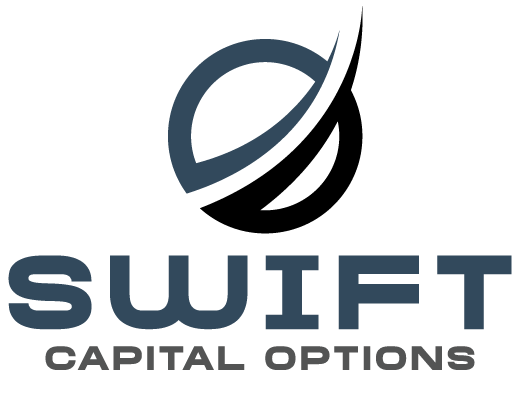Refinancing vs. Consolidation: A Comprehensive Comparison


At Swift Capital Options, we understand that managing business debt can be complex. Two popular strategies for managing debt are refinancing and debt consolidation. This guide will compare these options, helping you make an informed decision for your business's financial health.
Understanding Refinancing and Debt Consolidation
Refinancing
Refinancing involves replacing an existing loan with a new loan, typically with better terms such as a lower interest rate or different repayment period.
Debt Consolidation
Debt consolidation combines multiple debts into a single new loan or credit line, often with the goal of securing a lower overall interest rate and simplifying payments.
Key Differences
- Number of Debts Addressed
- Refinancing: Typically addresses a single loan
- Consolidation: Combines multiple debts into one
- Primary Goal
- Refinancing: Usually aims to secure better terms on a specific loan
- Consolidation: Aims to simplify debt management and potentially reduce overall interest
- Effect on Credit Score
- Refinancing: May have a minimal short-term impact
- Consolidation: Can have a more noticeable initial impact due to opening a new credit line
- Loan Terms
- Refinancing: Often maintains similar loan structure
- Consolidation: May significantly alter loan terms and duration
Pros and Cons of Refinancing
Pros:
- Potentially lower interest rate
- Possible reduction in monthly payments
- Opportunity to change loan terms (e.g., fixed vs. variable rate)
- Can improve cash flow
- Minimal change to overall debt structure
Cons:
- May extend the loan term, increasing total interest paid
- Potential for fees (e.g., origination fees, appraisal costs)
- Process can be time-consuming
- Might require collateral
- Limited to improving terms on a single loan
Pros and Cons of Debt Consolidation
Pros:
- Simplifies debt management with a single payment
- Potential for lower overall interest rate
- Can improve cash flow with lower total monthly payments
- Opportunity to pay off debt faster
- May improve credit score over time
Cons:
- Might result in paying more interest over time if term is extended
- Potential for high origination fees
- Risk of accumulating more debt if underlying financial issues aren't addressed
- May require collateral, putting assets at risk
- Could initially negatively impact credit score
When to Consider Refinancing
- When interest rates have dropped significantly since your original loan
- If your credit score has improved, potentially qualifying you for better terms
- When you want to change from a variable to a fixed-rate loan (or vice versa)
- If you need to lower monthly payments on a specific large loan
- When you want to remove a co-signer from a loan
When to Consider Debt Consolidation
- When managing multiple high-interest debts
- If you're struggling to keep track of various payment due dates
- When you want to simplify your debt repayment strategy
- If you can qualify for a consolidation loan with a lower overall interest rate
- When you need to improve cash flow by lowering total monthly debt payments
Factors to Consider When Choosing
- Current Financial Situation
- Assess your overall debt load, cash flow, and credit score
- Interest Rates
- Compare current rates with potential new rates
- Loan Terms
- Consider how new terms might affect long-term financial health
- Fees
- Calculate all associated costs for each option
- Long-Term Financial Goals
- Align your choice with broader business objectives
- Credit Impact
- Consider how each option might affect your business credit
- Collateral Requirements
- Assess risks associated with securing new loans
Steps to Refinance or Consolidate
- Review Current Debts
- List all debts with balances, rates, and terms
- Check Credit Score
- Higher scores generally mean better terms
- Research Options
- Explore various lenders and loan types
- Calculate Potential Savings
- Use online calculators to estimate outcomes
- Gather Documentation
- Prepare financial statements, tax returns, etc.
- Apply and Compare Offers
- Submit applications and carefully review terms
- Choose and Implement
- Select the best option and follow through with the process
Common Mistakes to Avoid
- Not Reading the Fine Print
- Understand all terms and conditions
- Focusing Only on Monthly Payments
- Consider total cost over the life of the loan
- Ignoring Fees
- Factor in all costs, including origination fees
- Extending Term Unnecessarily
- Longer terms may mean more total interest paid
- Continuing Poor Financial Habits
- Address underlying issues causing debt accumulation
- Not Shopping Around
- Compare offers from multiple lenders
- Overlooking Tax Implications
- Consult a tax professional about potential impacts
How Swift Capital Options Can Help
Choosing between refinancing and consolidation can be challenging. Here's how we can assist:
- Financial Analysis: Evaluate your current debt situation and financial health
- Option Comparison: Help weigh the pros and cons of each approach for your specific situation
- Lender Connections: Introduce you to reputable lenders for both refinancing and consolidation
- Offer Evaluation: Assist in analyzing and comparing offers
- Strategy Development: Help create a long-term debt management plan
- Application Support: Guide you through the application process for your chosen option
Your Next Steps
Ready to improve your business's debt situation? Here's what to do:
- Gather detailed information about all your current debts
- Review your business's financial statements and cash flow projections
- Check your business credit score
- Consider your long-term business and financial goals
- Contact Swift Capital Options to discuss how we can support your decision-making process
Remember, both refinancing and debt consolidation can be effective tools for managing business debt, but the best choice depends on your specific circumstances and goals.
Are you ready to take control of your business's financial future? Reach out to Swift Capital Options today. Let's work together to analyze your debt situation, explore your options, and develop a strategy that aligns with your business objectives. With our expertise guiding you through this crucial decision, you can move forward with confidence, knowing you're making the best choice for your business's financial health. Whether refinancing or consolidation is the right path for you, we're here to help you navigate towards a stronger, more stable financial future for your business.




